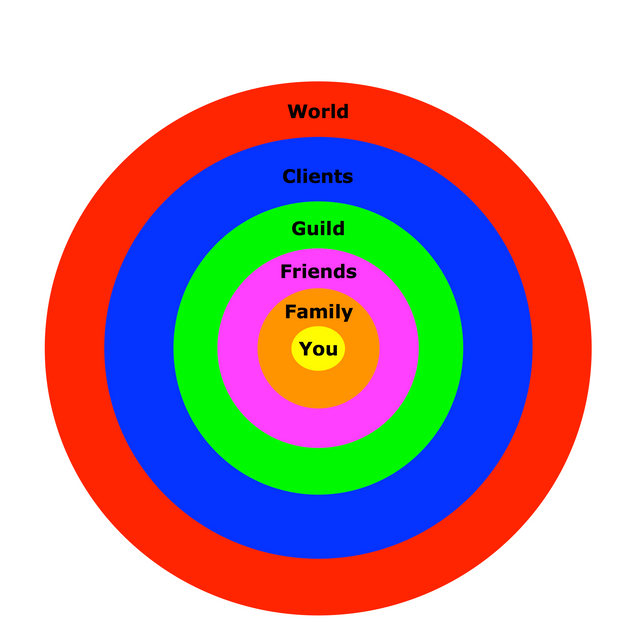6 Degrees Of Integration - Guilds

This is the fifth article from the series 6 Degrees Of Integration. There is a list of all the articles that are part of this series at the end of the post.
Value Is Context Dependent, Intention Has Inertia
In the first posts we discussed how value is entirely subjective, context-dependent and how context has an inherent inertia. Our intentions to modify the environment will always need a certain time to manifest and that time depends on the value we have and how adapted that value is to that specific context.
The only thing that we can modify instantly is how we feel and what we do about our current situation, which obviously won’t change the situation instantly, but it will shape the value we create in order to change our experiences in the future.
We realized that we function on flawed hardware and software (our body is decaying every second and we can't understand something if didn't learn that first). So the basic approach to our daily interaction with the world should be: don't believe everything you see and don't believe everything you think.
The first insertion point in the outside world is family (in the sense of the context in which we are brought up). We observed that at the child level we are completely dependent on what we are taught by our parents. At the adult level we use our partner or spouse to make ourselves accountable, and once we get old we reaped what we sowed.
The second insertion point is represented by friends, which are both helping create value (by offering support and validation) and act as a partial context for the value we created.
Now, let's move onto guilds, or professional circles.
Guilds, Calibration And Complementarity
In time, we gather a specific set of skills. We use these skills in transactions, to generate value. Those skills can be specific, like coding, or broad, like teaching. This is the main process by which we generate value. In the current system, value is most of the time evaluated in money (which is nothing but a form of generalized agreement). We get that money from people who are using our skills, generally named clients.
But before reaching to clients we spend a lot of time in our own professional circles. I personally prefer the word guilds for that, but you may use whatever you want. These guilds are very important.
The current western approach towards transactions, highly competitive, pushed the guilds into the land of competition. According to this system, everybody doing the same thing is a competitor and it takes a piece of the pie. Your pie, that is. That makes guilds your enemy, not your partner.
I think this accounts for a large part of our current problems, at the economical level. Competition promotes a mindset of scarcity and suspicion. It projects a vision of "not enough". It's true that sometimes, there aren't enough resources. Life goes up and down. But these shortages are temporary. There's really no need to believe that there will always be shortage and that you have to always strive and fight against your market competition. Maybe now it's bad, ok, go ahead and strive. But it will not always be like this, so there's no need to vilify or reject other professionals in your circle.
Lately, the syntagm "blue ocean" gained a little bit of momentum, and I'm really happy about it. "Blue ocean", as opposed to "red ocean", means there's no blood in the waters. The ocean is big enough to support every player. I constantly tried to apply this strategy in my own business endeavors, ever since I first learned about it. Sometimes it went well, sometimes it didn't, but the bottom line is that swimming in a blue ocean, even if it's crowded, it's much better than swimming in a red ocean.
The value we create depends largely on how suitable our skills are. And our skills are dependent on our experience, learning capacity, discipline and many other parameters. Using guilds as a constant method of transferring knowledge will drastically improve the skills of all the actors involved in the game. Even exchanging clients will eventually create a much better experience for everybody.
To summarize, guilds are a perfect tool for calibrating our skills (how good are we, compared with others, what skills are required, how big is the market, etc) and for finding ways to complement each other services.
Those two processes are probably the most effective ways to grow our perceived value, yet, because of our flawed, highly aggressive economical system, they're seldom implemented.
In the last post I estimated that we spend around 35% of our time in the last 3 circles: guilds, clients and the world. From that percentage, I think we're about 10% in the guilds area all the time.
Or at least we should be.
All the articles in this series:
1. 6 Degrees Of Integration - Introduction
2. 6 Degrees Of Integration - You
3. 6 Degrees Of Integration - Family
4. 6 Degrees Of Integration - Friends
I'm a serial entrepreneur, blogger and ultrarunner. You can find me mainly on my blog at Dragos Roua where I write about productivity, business, relationships and running. Here on Steemit you may stay updated by following me @dragosroua.

https://steemit.com/~witnesses